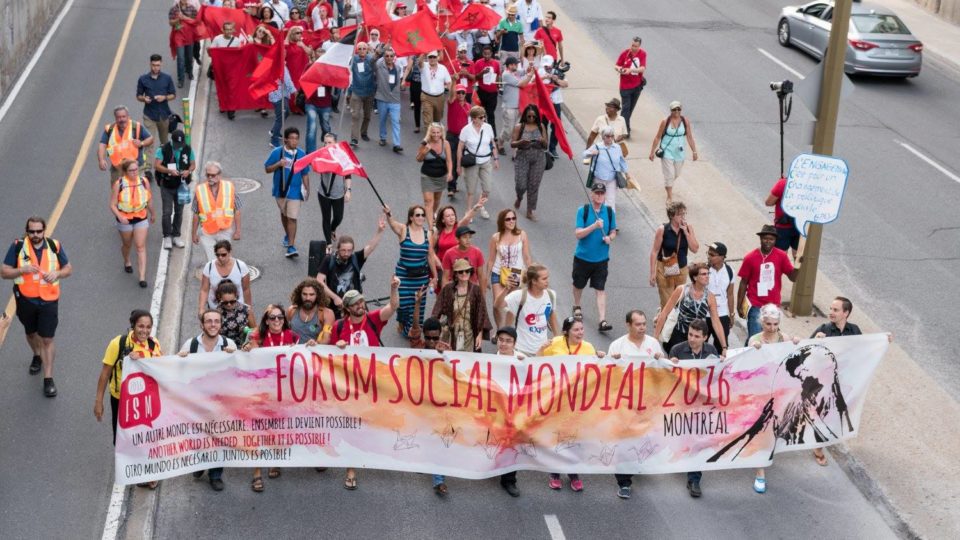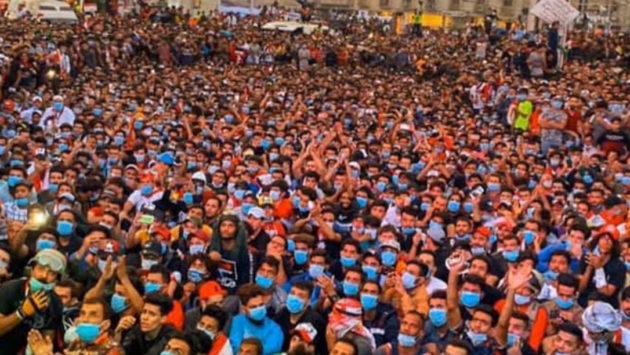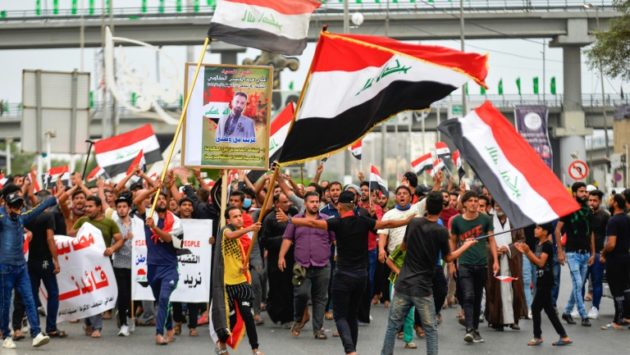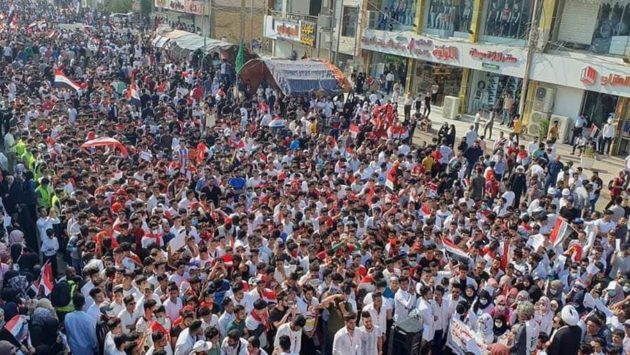The Iraqi protest movement explained, at World Social Forum 2016
By ICSSI, August 2016.
The World Social Forum 2016 took place for the first time in a country of the Global North, gathering activists from all over the world in Montreal (Canada) on 9-14 of August. The rationale was that people’s struggles for human rights and dignity, to protect the environment and stop militarization, need to strengthen in Northern America where many root causes of the current global crisis lie.
But it has been impossible to obtain a Canadian visa for most activists of the Global South who wanted to attend, and this became a major political issue in the evaluation of the forum as a meeting space for activists, unions and NGOs.

Members of the Iraqi Social Forum did not even try to reach Montreal, and decided to organize a parallel activity in Baghdad – the Montreal cafè – connecting with Canada by video conference. They talked by Skype with international members of the Iraqi Civil Society Solidarity Initiative from Europe, Canada, UK and the USA who instead took part in the Montreal forum to start rebuilding ties between the Iraqi civil society and the American peace movement. This goal has been reached thanks to the participation of Jassim al-Helfi (President of the Information Centre and co-founder of the Iraqi Social Forum), who spoke in several activities about the need to analyze the Middle Eastern crisis in a comprehensive framework (the Syrian situation is intertwined with the Iraqi one!) and the importance of struggling against Daesh (IS) through civil and political means, starting by reforming the Iraqi institutions and the political system.
He gave a precise overview of the protest movement in Iraq, and explained that the alliance between laical/leftist forces and the massive movement of the shia cleriq Moqtada al-Sadr really brought to the sqares the poor and the working class. When they broke into the Green Zone, tearing down concrete walls through nonviolent action, and saw water flowing in the irrigation system inside, and electricity available all day and night, they became profoundly aware of the inequality in place, and the injustice of this reality.
We saw North American peace activists crying while listening to Jassim’s speech, perceiving the power of this Intifada and the courage of its leaders, and blaming western media for not talking about it. ICSSI gained new partners and regained old ones who had not managed to keep active ties with the Iraqi civil society in recent years, like the NGO “War on Want” from UK. We also found a new young volunteer from the Iraqi community in Montreal, who dreams to go back to her country, and now knows that many young people in Baghdad are working to make another Iraq possible.
***
The speech by Jassim al-Helfi follows, pronunced at the World Social Forum on 12 August 2016, in the activity titled: International solidarity with the Iraqi protests and with people’s civil struggle in Middle-East against fundamentalism, sectarianism and authoritarianism. Daesh (IS) is not the only threat! Co-promoted by: Alternatives (CANADA), Associação Alternativa Terrazul (BRASIL), Forum Marocain des Alternatives Sud (MAROC), Initiatives Pour un Autre Monde (FRANCE), September 11 Families for Peaceful Tomorrows (USA), Transform! (EUROPE), Un ponte per… (ITALY)
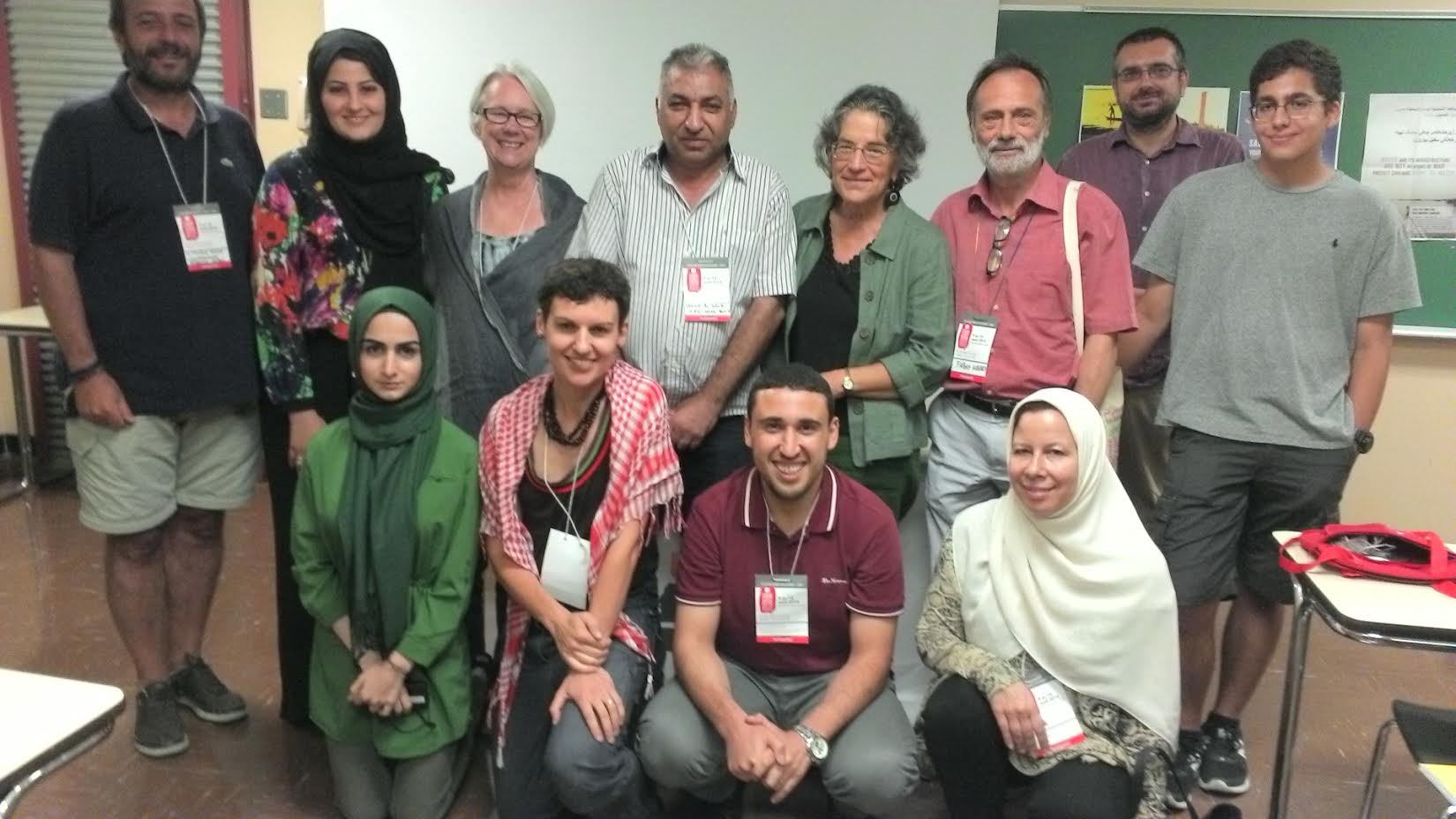
Rights, Freedoms and Social guarantees.
The demands of the protest movement in Iraq
The basic reasons of the protest movement: Due to the current political, social and economic crisis in Iraq social inequality is increasing because of the great polarization in the distribution of income and wealth. The gap between rich and poor people became wider and the number of millionaires and billionaires is increasing, exploiting the people and the national economy. A certain class of people has seized control of the funds in various ways, while large segments of the Iraqi people are living on the poverty line or below. These are the main motives behind the protest against the poor living conditions of Iraqis nowadays. People who marched in the streets also gave a clear indication of their rejection of sectarianism, of corruption and of the quota system based on ethnicities and religions, which is the basis of the political and administrative system built after 2003. Since that year corruption spread in all state institutions, squandering the wealth of Iraq and causing the deterioration of security, allowing Daesh (ISIL) to occupy one third of the Iraqi area.
The protest movement demands: The demonstrators have strongly carried on legitimate demands, which can be summarized in these three important requests to institutions:
1- Reform the political system, get rid of sectarian quotas that are the basis of the crisis and the cause of system failure, and work on rebuilding the system attributing equal rights and duties to all citizens.
2- Take a clear position against corruption that has spread in the joints of the state and caused the necrosis of institutions; prosecute the corrupt and bring them rapidly to justice in order to give a strong signal against their deeds; this requires reform of the judiciary and freeing it from political, sectarian and ethnic influences, promoting its independence through a series of fast legislation and procedures.
3- Guarantee the provision of essential public services to all citizens, allowing them to live a decent life.
The protest movement features:
1- Clarity of purpose: the demonstrators demanded clearly and boldly to reform the political system, to eliminate the quota system and corruption, and to promote the national identity rather than sub-identities in politics and administration.
2- National dimension of the demonstrations: they took place in all of Iraq’s provinces, districts and many villages, with the exception of all areas under the control of Daesh; to prove their patriotism, people raised only the Iraqi flag and did not allow the lifting of religious pictures nor party symbols.
3- Popular character: Activists from all classes and categories of Iraqi society contribute to the struggle; they are workers, peasants, businessmen, intellectuals and many women, even if in the streets we can mostly find young people.
4- Social Content: the issues and demands that mostly affect social wellbeing have been shouted in slogans and rallying cries of demonstrators, who are calling for social justice, social security, the fight against unemployment and inequality, an adjustment of the pay scale.
5- Legitimate demands: the character of this movement is legitimate since it touches human life and basic rights, calling for respect for humanity and dignity; the money allocated in the state budget would be enough to cover these needs, if funds were managed carefully, efficiently and conscientiously, and was it not stolen by corrupt politicians.
6- Peaceful method: Citizens have the right to express themselves, by organizing and demonstrating peacefully, practicing nonviolent struggle.
Tangible results of the protest movement: It’s too early to count the direct and indirect achievements of the popular movement, however you we can enumerate the following results so far: – promoting the concept of the civil state- defeating power symbols- shaking the sectarian political construction from the base- producing cracks in the wall of the quota system- expressing a political party and having some members elected in parliament.- activating a supervisory role on the parliament and on the selection of ministries- imposing the dismissal and removal of senior officials in many of the provinces where demonstrations took place- causing the dismissal of ministers- forcing the government to announce that it would reduce the salaries and allowances of officials and politicians with special ranks- raising the level of political awareness of hundreds of thousands of citizens, and young people in particular, who participated and watched demonstrations, as a political training field- defeating the routine and breaking the fear and hesitation towards institutions among ordinary citizens- spreading the goal of promoting social justice on a large scale.
Conclusions:
– The popular protest and demonstrations cannot achieve complex political goals and demands at once.- The reform process began, and it is hard to stop. On the other hand it is important to analyze the momentum and be realistic, not to rush towards apparent victories.
– The current political system based on sectarianism and ethnic quotas is unable to seriously reform itself, so it is necessary to speed up the rebuilding of the political system based on equal citizenship.
– There is increasing awareness of the importance of building a civil state that relies on the principle of citizenship to build an alternative to sectarian parties.
– The protest movement showed the failure of all factions who bet on the indifference of the citizens, and their inability to claim their rights.
– Youth activists emerged in the protest, with an effective role in the movement and great ability to mobilize public opinion and citizens, even if sometimes they may shout sectarian slogans or do not prevent factions from doing it.
Jassim al-Helfi is the President of the Information Centre for Research and Development in Baghdad (Maaluma) and co-founder of the Iraqi Social Forum, currently member of its National Committee. He is one of the leading figures in the civil coalition that organizes anti-corruption demonstrations in Baghdad every Friday, since July 2015, asking for transparent and accountable institutions, and an end to confessionalism in Iraqi politics. He believes the struggle against Daesh (Islamic State) is a political one, and requires an institutional change.

